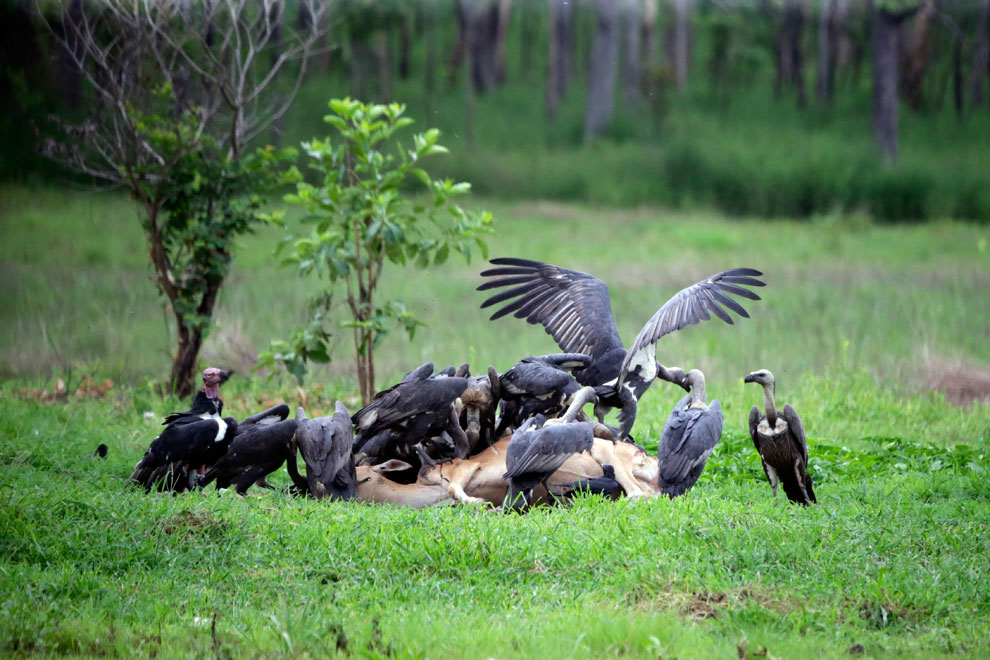
Vultures descend to eat a cow in Preah Vihear province in June. On International Vulture Awareness Day on Saturday, 10 organisations expressed concern about the declining vulture population in the Kingdom. Heng Chivoan
Ten organisations issued a joint statement for the 2020 International Vulture Awareness Day on Saturday, expressing concern about the declining vulture population in the Kingdom.
The statement read: “Today we are celebrating International Vulture Awareness Day with a message that clearly states that vultures need all our help if they are to survive in Cambodia.”
Wildlife Conservation Society (WCS) country director Ken Serey Rotha said vultures play an important role in maintaining the environment’s equilibrium by stripping meat off carcasses, something that helps reduce the spread of disease.
Rotha referred to the birds as nature’s “clean-up crew”. But their lives are endangered when they ingest toxic meat, especially that containing the pesticide carbofuran.
“Most people think that vultures are a very dirty species. But it’s not like that. Vultures are an active and wonderful agent to clean the environment,” Rotha said.
He said there are hardly any vultures left along the Mekong River in the Siem Pang Wildlife Sanctuary in Stung Treng province and the Chhep Wildlife Sanctuary in Preah Vihear province.
Due to deforestation, hunting, trapping and the use of poison to capture wildlife, vultures are at high risk of extinction, he said.
According to the annual census of the Cambodian Vulture Working Group (CVWG), which was conducted in early June, the vulture population in Cambodia has decreased by about 50 per cent over the past 10 years. Last year, 137 vultures were recorded in the Kingdom, while this year only 119 were spotted.
Angkor Centre for the Conservation of Biodiversity (ACCB) country director Michael Meyerhoff said: “All Cambodians can be proud to still have vultures in the country.
“But everyone needs to support their conservation by protecting their habitats and especially by stopping wildlife poisoning. Otherwise, Cambodia’s vultures will go extinct, as in neighbouring Thailand and Vietnam.”
Teak Seng, the country director of WWF-Cambodia also expressed concern about pesticides which not only endanger vultures’ lives but also affect the health of humans and livestock.
Seng said: “WWF is advocating for a ‘One Health’ approach linking the health of people, animals and the environment, and we urge this to be included in decision-making on wildlife and land-use changes.”
Recently, researchers studying the biology and migration of vultures in Cambodia confirmed that they can reach altitudes of 6km or higher and can travel as fast as 100km/h.
The three vulture species in Cambodia are red-headed vultures, slender-billed vultures and white-rumped vultures.
Ministry of Environment secretary of state and spokesman Neth Pheaktra told The Post on Sunday that the decline in vulture numbers in Cambodia was due to loss of habitat, food shortages, poaching and the use of poisons.
Pheaktra urged people to participate in the conservation of vultures by refraining from hunting and trading wildlife illegally.











